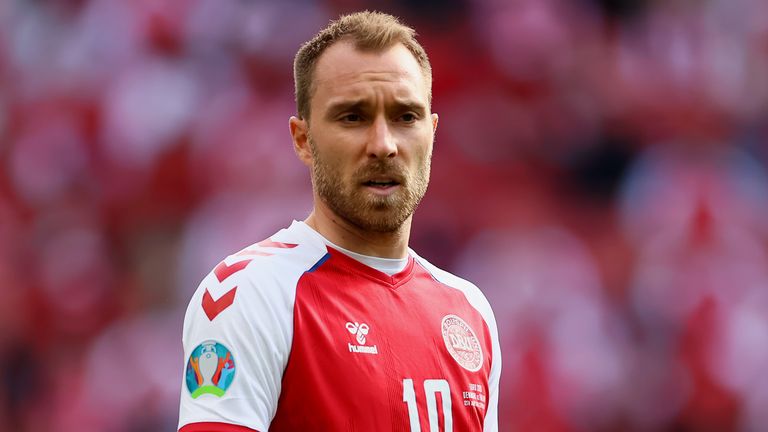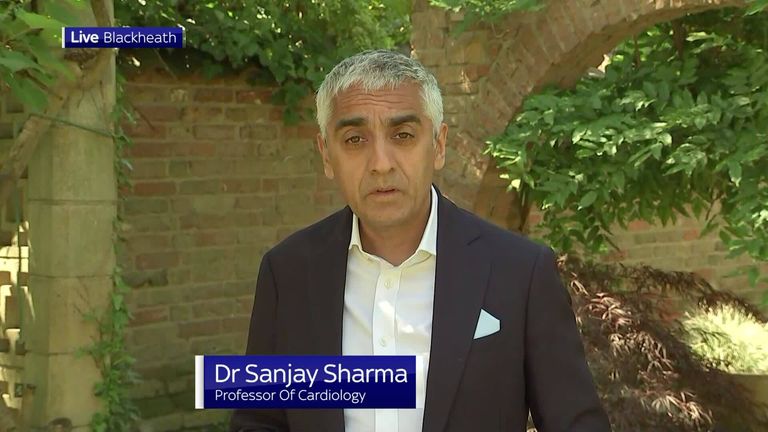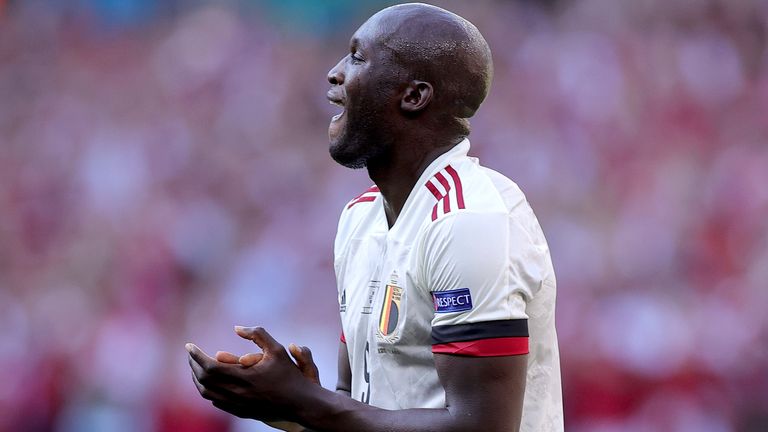Christian Eriksen: Denmark midfielder discharged from hospital after successful operation
Christian Eriksen was given CPR on the pitch during Denmark's game against Finland on Saturday, which was halted as the 29-year-old was taken to hospital; midfielder has been fitted with a heart-starting device and has been discharged
Saturday 19 June 2021 06:15, UK
Denmark midfielder Christian Eriksen has been discharged from hospital after a successful operation to fit a defibrillator implant.
The 29-year-old Inter Milan playmaker was resuscitated on the pitch at the Parken Stadium in Copenhagen on Saturday after suffering a cardiac arrest during the first half of his side's 1-0 Euro 2020 Group B defeat to Finland.
Eriksen has returned home after having a cardioverter defibrillator (ICD) implanted.
A statement from the Danish FA read: "Christian Eriksen has been through a successful operation and was today discharged from Rigshospitalet.
- Belgium into last 16 after De Bruyne masterclass
- Delaney: Denmark stronger together after Eriksen collapse
- Denmark boss criticises UEFA after Eriksen collapse
"Today he also visited the national team in Helsinger and from there he will go home and spend time with his family."
Eriksen added in a statement: "Thank you for the massive number of greetings, it has been incredible to see and feel.
"The operation went well and I am doing well under the circumstances. It was great to see the guys again after the fantastic game they played last night.
"No need to say that I will be cheering them on Monday against Russia."
What is an ICD?
The British Heart Foundation describes an Implantable Cardioverter Defibrillator (ICD) as a small device that can treat people with dangerously abnormal heart rhythms.
It sends electrical pulses to regulate these rhythms, especially those that could be dangerous and cause a cardiac arrest.
If an ICD notices a dangerous heart rhythm it can deliver one or more of the following treatments:
- Pacing - a series of low-voltage electrical impulses (paced beats) at a fast rate to try and correct the heart rhythm.
- Cardioversion - one or more small electric shocks to try and restore the heart to a normal rhythm.
- Defibrillation - one or more larger electric shocks to try and restore the heart to a normal rhythm.
How did CPR save Eriksen's life?
CPR is quite easy to learn and it can be the difference between life and death before emergency medical services can arrive to help out.
So what is it, how does it make a difference and how should you behave if you find yourself in an emergency?
What is CPR?
CPR stands for cardiopulmonary resuscitation and is a medical technique which is given to someone who goes into cardiac arrest.
That occurs when the heart encounters an electrical issue and stops pumping blood around the body and to the brain, causing the person to fall out of consciousness and stop breathing.
Medics define this as 'clinical death', which is the onset of biological death, although CPR can help re-start the person's heart functions and save their life.
By administering chest compressions and rescue breaths, the CPR performer helps to pump blood and oxygen around the person's body, taking over the role of their heart and lungs.
Why is CPR so important?
"Time is myocardium, that's what we say in medicine - that means the longer that there is a time delay, the higher the chance that the heart muscle will never recover," Professor of Cardiology Dr Sanjay Sharma told Sky Sports News.
"In fact for every minute that passes, the chances of an individual surviving go down by between seven and 10 per cent. So it's very, very crucial to keep the heart beating during these crucial moments and get the heart started as quickly as possible.
"Not just so that the cardiac outcome will be good, but also that the other organs, such as the brain, remain well perfused so that the individual after survival remains healthy."
How do you perform CPR?
Always seek professional help by calling 999 before starting CPR.
The NHS's advice to carry out chest compressions is as follows:
- Place the heel of your hand on the breastbone at the centre of the person's chest. Place your other hand on top of your first hand and interlock your fingers.
- Position yourself with your shoulders above your hands.
- Using your body weight (not just your arms), press straight down by 5 to 6cm (2 to 2.5 inches) on their chest.
- Keeping your hands on their chest, release the compression and allow the chest to return to its original position.
- Repeat these compressions at a rate of 100 to 120 times a minute until an ambulance arrives or you become exhausted.
The British Heart Foundation recommends that in an emergency situation it is better to try and perform CPR, even if unsure, rather than to not do anything at all.
For more information on FA medical courses which can help to deal with such things as cardiac arrest and how to treat them, visit the FA Bootroom.







